MercoPress. South Atlantic News Agency
Tag: soybean
-
Saturday, August 1st 2020 - 06:27 UTC
Brazil expects a record soybean harvest of 130 million tons

Brazil’s soybean production in 2020/21 is expected to jump to a record 130 million tons, with good prices driving farmers to increase planting in pasture areas after a drought reduced the harvest in the south of the country in 2019/20.
-
Monday, July 27th 2020 - 09:13 UTC
Brazil soy bean exports to China soar to a record high in June: 10.1 million tons
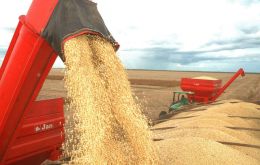
China's soya bean imports in June from top supplier Brazil soared to a record high, according to customs data released on Sunday, driven by growing demand for soya beans as China's pig herd recovers after deadly outbreaks of African swine fever.
-
Wednesday, July 1st 2020 - 08:36 UTC
Chinese May imports of Brazilian soybeans at their highest level in two years
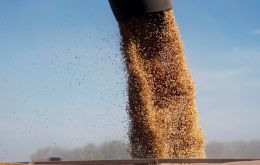
Beijing customs data indicates that Chinese soy imports from Brazil (now its largest supplier), reached its highest level in two years in May. China is the world’s largest importer of soy.
-
Tuesday, June 9th 2020 - 07:25 UTC
Argentina will take over soy-crushing giant, currently under administration

Argentine President Alberto Fernandez announced Monday evening a plan to seize crop trader Vicentin SAIC in a move that is anticipated will ring alarm bells in soy markets, among investors in the country and even the current foreign debt negotiations.
-
Tuesday, June 2nd 2020 - 08:57 UTC
Helped by a weaker currency, record export of Brazilian soybean to China
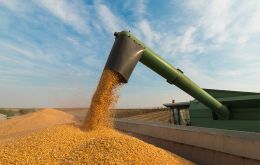
Brazil's May soybean exports jumped 45% on the year to reach 15.5 million tons, the second-highest monthly soy shipment ever, the latest foreign trade department data released on June first showed, with a hefty 74% of this volume bound for China.
-
Tuesday, May 19th 2020 - 07:58 UTC
Brazilian agribusiness exports to China booming

In the first four months of this year, Brazilian agribusiness exports totaled US$31.40 billion, marking a 5.9% increase year-on-year. The growth of agribusiness exports resulted in an increase in volumes 11.1%, while the index price suffered a drop of 4.7%.
-
Friday, March 13th 2020 - 08:10 UTC
Argentina soybean output forecast to reach 52 million tons, down 6% year on year
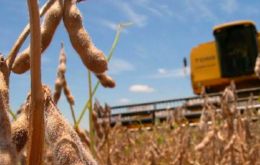
Soybean output for Argentina -- the world's third-largest soy producer and exporter -- is forecast to be at 52 million tons, down 4.6% on February estimates and 6% year on year, in 2019-20 crop year (November-October), on dry conditions in Córdoba and Santa Fe, a Buenos Aires Grains Exchange report said on Thursday.
-
Monday, March 9th 2020 - 08:57 UTC
Argentine farmers begin four day sales strike to protest higher export taxes

Argentina’s main farm groups will hold a four-day sales strike this week, officials with local growers groups said on Thursday, to protest a tax hike that soy crushing companies warn will cripple investment in the key sector.
-
Saturday, February 22nd 2020 - 09:24 UTC
Intense rains in Brazil limiting soybean harvest and delaying exports
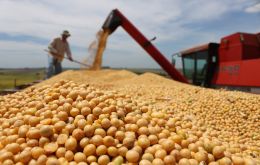
Intense rains in parts of Brazil have limited the advance of the soybean harvest over the past few days while also delaying exports of the oilseed, agribusiness consultancy Arc Mercosul said on Friday.
-
Monday, February 3rd 2020 - 07:26 UTC
Argentina's soybean crop forecasts increase to 53.1 million tons on favorable moisture conditions

Argentina's soybean harvest for the 2019/20 season is forecast at 53.1 million tons, the Buenos Aires grains exchange said last week, an improvement from a prediction it made towards the end of last year.
